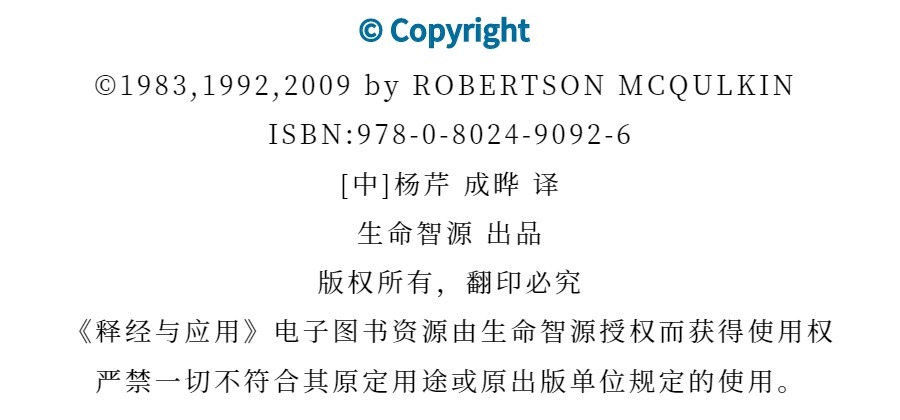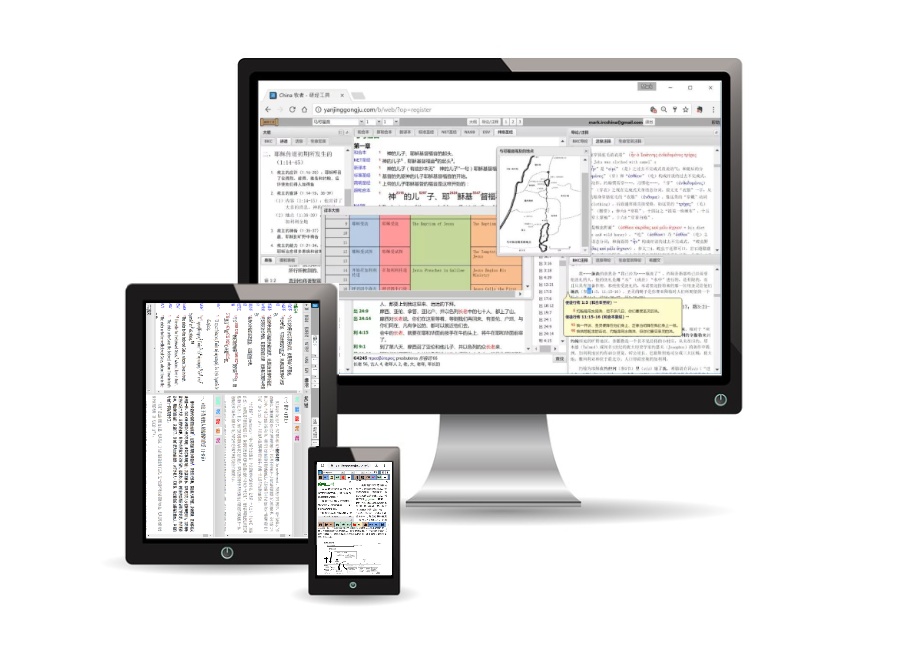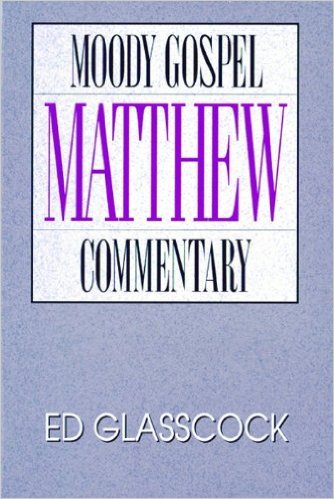个人经历
教义释经的第三种错误方法是允许个人经历来建立教义。从积极的一面来看,基督徒对神的体验促使他们想更多地认识神。我们越是顺服信靠神,神也就越发显出他是信实的。但是,基督徒的个人经验也可能成为正确解释圣经的阻碍。只有圣经本身才具有最终权威,而不是个人经历神的主观感受。例如,伴随着重生的经历,一个人往往形成对罪、耶稣基督、圣灵的工作、教会的宗旨等许多教义的理解。如果他之后拒绝在圣经的光照之下改变他的观念,反而说“但是我知道自己一直信的就是对的,因为我曾经亲身经历过”或者“神那时在我生命中动工,因此我知道这一定是对的”,如此一来,个人的经历就变成了权威。然而,我们必须根据圣经来解释个人经历,而不是用个人经历来解释圣经。
我们在形成个人对某段经文的解释或个人的教义体系时,必须极其谦卑,偏离教会一致公认的智慧,是很危险的。尽管当今世界标榜个人的自主性,但圣灵以他的方式带领他的教会,这种方式没有哪个人能够独有。谨记,我们每一个人都必须为自己如何应用圣经负责,正如《提摩太后书》2 章 15 节所说:“你当竭力在神面前得蒙喜悦,作无愧的工人,按着正意分解真理的道。”
到此,我们已经讨论了四种能将研读圣经的基督徒领入歧途的释经方法:充满寓意或神秘色彩的前现代超自然释经,理性的现代释经,将自然主义和主观主义生硬结合的后现代释经,以及用既定的框架来解释每段经文的教义释经。值得注意的是,上述这些释经法分别建立在有关圣经的一个正确的前设之上,即圣经是超自然的,圣经是自然的,圣经必须被运用,圣经是前后连贯的、其所有教导彼此相合成为一个整体。问题在于,这四种释经法都只强调有关圣经的一个前设,而忽视了其他同样正确的前设。解决这个问题的方法就是在解释圣经时兼顾圣经的所有前设。
这些关于圣经的前设隐含着一些原则,我们将在下一章介绍。之后,我们会分析由这些原则衍生的具体指导方法。
推荐阅读书目
Adam, A. K. M. Reading Scripture with the Church. Grand Rapids: Baker, 2006.
Baker, David, and Bill Arnold, eds. The Face of Old Testament Studies. Leicester, England: Apollos, 1999.
Bartholomew, C., et al., eds. After Pentecost. Grand Rapids: Zondervan, 2001.
Bartholomew, Craig, Colin Greene, and Karl Moller, eds. Renewing Biblical Interpretation. Grand Rapids: Zondervan, 2000.
Berkhof, Louis. Principles of Biblical Interpretation. Grand Rapids: Baker, 1950.
Black, D. A., and D. S. Dockery, eds. Interpreting the New Testament. Nashville: Broadman & Holman, 2001.
Broyles, C. C., ed. Interpreting the Old Testament. Grand Rapids: Baker, 2001.
Carson, Donald A. Exegetical Fallacies. Grand Rapids: Baker, 1984.(卡森著,《再思解经错谬》,校园书房出版社)
Carson, D. A., and J. D. Woodbridge, eds. Hermeneutics, Authority, and Canon. Grand Rapids: Zondervan, 1992.
Corley, Bruce, Steve W. Lemke, and Grant I Lovejoy,. Biblical Hermeneutics. 2nd Ed. Nashville: Broadman & Holman, 2002.
Cotterell, Peter, and Max Turner. Linguistics and Biblical Interpretation. London: SPCK, 1989.
Erickson, Millard. Evangelical Interpretation. Grand Rapids: Baker, 1993.
Fee, G. D. New Testament Exegesis. 3rd ed. Louisville: Westminster John Knox, 2002.
Fee, Gordon, and Douglas Stuart. How to Read the Bible for All its Worth. Grand Rapids: Zondervan, 2003.
Ferguson, Duncan S. Biblical Hermeneutics. Atlanta: John Knox Press, 1986.
Fowl, Stephen E. Engaging Scriptures. Malden, Mass.: Blackwell, 1998.
Goldsworthy, Graeme. Gospel-Centered Hermeneutics. Downers Grove, Ill.: InterVarsity, 2006.
Green, J. B., ed. Hearing the New Testament: Strategies for Interpretation. Grand Rapids: Eerdmans, 1995.
Johnson, Elliot. Expository Hermeneutics. Grand Rapids: Zondervan, 1990.
Kaiser, W., and M. Silva. An Introduction to Biblical Hermeneutics. Grand Rapids: Zondervan, 1994.
Kim, W., D. M. Floyd and M. A. Sweeney, eds. Reading the Hebrew Bible for a New Millennium. 2 vols. Harrisburg, Pa.: Trinity Press International, 2000.
Klein, William W., Craig L. Blomberg, and Robert L. Hubbard, Jr. Introduction to Biblical Interpretation. Nashville: Nelson, 2004.(克莱恩、布鲁姆伯格、哈伯德著,《基督教释经学》,上海人民出版社)
Mickelsen, A. Berkeley. Interpreting the Bible. Grand Rapids: Eerdmans, 1963.
Moyise, Stephen. Introduction to Biblical Studies. London: Cassell, 1998.
Osborne, G. R. The Hermeneutical Spiral. 2nd ed. Downers Grove, Ill.: InterVarsity, 2006.(奥斯邦著,《基督教释经学手册》,校园书房出版社)
Poythress, Vern. God Centered Biblical Interpretation. Phillipsburg, N. J.: Presbyterian and Reformed, 1999.
Ramm, Bernard. Protestant Biblical Interpretation. 3rd ed. Grand Rapids: Baker, 1970.(兰姆著,《基督教释经学》,美国活泉出版社)
Stuart, D. K. Old Testament Exegesis. 3rd ed. Louisville: Westminster John Knox, 2001.
Tate, Randolph W. Biblical Interpretation. Peabody, Mass.: Hendrickson, 1991.
Terry, Milton. Biblical Hermeneutics. Reprint; Grand Rapids: Zondervan, 1974.
Virkler, Henry A. Hermeneutics. 2nd ed. Grand Rapids: Baker, 2007.
Zimmermann, Jens. Recovering Theological Hermeneutics. Grand Rapids:Baker, 2004.









